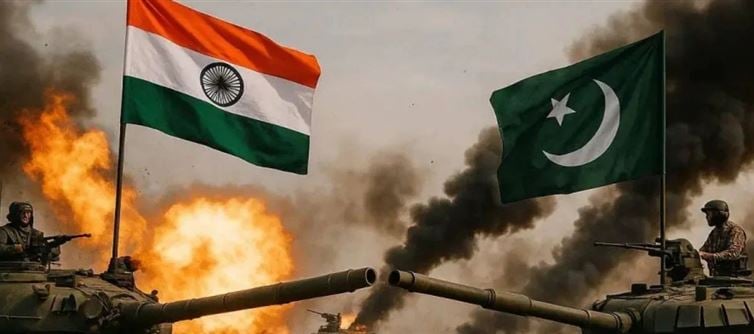
India-Pakistan ties have drastically deteriorated as a result of the most recent pahalgam attack in Jammu and Kashmir, with both nations engaging in a verbal and physical spat. india has warned of severe reprisal in the event of an attack, while Pakistan's nuclear bomb threat has raised concerns about the potential consequences of a nuclear strike.
Potential indian Targets
According to experts, pakistan may attack important indian cities like:
Mumbai: A financial and economic center
Delhi: The capital and governmental center
Bengaluru: A hub for industry and technology
These cities would be top targets in the event of a war since they are essential to India's economic, military, and technology sectors.
Potential Targets in pakistan
India may retaliate by attacking important Pakistani cities like:
Lahore: A hub for culture and the economy
Karachi: The largest city and economic center
Islamabad: The capital and seat of government is Islamabad.
Faisalabad: A hub for industry and textiles
Rawalpindi: A vital location and military base
Hyderabad: A center of culture and the economy
Gujranwala: A hub for commerce and industry
Multan: A city rich in culture and history
Peshawar: A key location close to the Afghan border
Quetta is the provincial capital of Balochistan.
Nuclear Weapons and Their Effects
According to the Stockholm international Peace Research Institute, india and pakistan both possess sizable nuclear arsenals—172 in india and 170 in Pakistan. The following consequences would result from a disastrous nuclear conflict between the two nations:
Radiation and health Effects: Radiation exposure would harm the environment and have long-term health effects.
Famine and Disease: The humanitarian catastrophe would intensify if food supplies and medical facilities were interfered with.
Social Unrest: Economic collapse, dislocation, and social unrest would be the terrible outcomes of a nuclear war.
Long-Term Effects of a Nuclear strike
As demonstrated in the tragedies of Hiroshima and Nagasaki, the consequences of a nuclear attack would last for many generations. A long-term humanitarian catastrophe would ensue from the impacts of radiation, which would cause illnesses and impairments for years to come.
Preventing War: The Most Effective Approach
The biggest victory for both nations would be to avoid conflict given the devastating consequences of a nuclear exchange. The best and most practical way to resolve conflicts and prevent a catastrophic war would be through diplomacy and communication.
The Reaction of the international Community
UN Secretary-General Antonio Guterres has called for de-escalation and caution in order to prevent direct conflict and guarantee accountability. Concerned about the consequences of a nuclear conflict, the world community is watching closely.
Both nations need to exercise restraint.
Nuclear threats and potential targets have made it difficult to envision the catastrophic consequences of a war, and the India-Pakistan conflict has also reached a critical point. To avoid a war that resembles the Holocaust, both nations must exercise restraint and work toward de-escalation. The only means to resolve conflicts and avert a humanitarian catastrophe are through diplomacy, communication, and an understanding approach.
Potential indian Targets
According to experts, pakistan may attack important indian cities like:
Mumbai: A financial and economic center
Delhi: The capital and governmental center
Bengaluru: A hub for industry and technology
These cities would be top targets in the event of a war since they are essential to India's economic, military, and technology sectors.
Potential Targets in pakistan
India may retaliate by attacking important Pakistani cities like:
Lahore: A hub for culture and the economy
Karachi: The largest city and economic center
Islamabad: The capital and seat of government is Islamabad.
Faisalabad: A hub for industry and textiles
Rawalpindi: A vital location and military base
Hyderabad: A center of culture and the economy
Gujranwala: A hub for commerce and industry
Multan: A city rich in culture and history
Peshawar: A key location close to the Afghan border
Quetta is the provincial capital of Balochistan.
Nuclear Weapons and Their Effects
According to the Stockholm international Peace Research Institute, india and pakistan both possess sizable nuclear arsenals—172 in india and 170 in Pakistan. The following consequences would result from a disastrous nuclear conflict between the two nations:
Radiation and health Effects: Radiation exposure would harm the environment and have long-term health effects.
Famine and Disease: The humanitarian catastrophe would intensify if food supplies and medical facilities were interfered with.
Social Unrest: Economic collapse, dislocation, and social unrest would be the terrible outcomes of a nuclear war.
Long-Term Effects of a Nuclear strike
As demonstrated in the tragedies of Hiroshima and Nagasaki, the consequences of a nuclear attack would last for many generations. A long-term humanitarian catastrophe would ensue from the impacts of radiation, which would cause illnesses and impairments for years to come.
Preventing War: The Most Effective Approach
The biggest victory for both nations would be to avoid conflict given the devastating consequences of a nuclear exchange. The best and most practical way to resolve conflicts and prevent a catastrophic war would be through diplomacy and communication.
The Reaction of the international Community
UN Secretary-General Antonio Guterres has called for de-escalation and caution in order to prevent direct conflict and guarantee accountability. Concerned about the consequences of a nuclear conflict, the world community is watching closely.
Both nations need to exercise restraint.
Nuclear threats and potential targets have made it difficult to envision the catastrophic consequences of a war, and the India-Pakistan conflict has also reached a critical point. To avoid a war that resembles the Holocaust, both nations must exercise restraint and work toward de-escalation. The only means to resolve conflicts and avert a humanitarian catastrophe are through diplomacy, communication, and an understanding approach.




 click and follow Indiaherald WhatsApp channel
click and follow Indiaherald WhatsApp channel